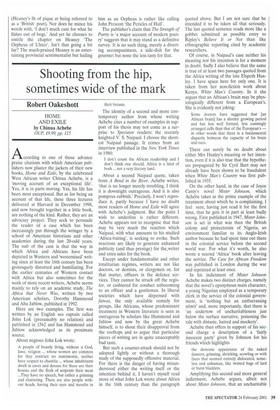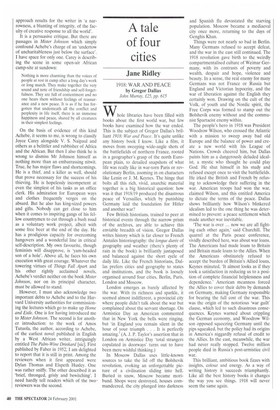Shooting from the hip, sometimes wide of the mark
Robert Oakeshott
HOME AND EXILE by Cbinua Achebe OUP, .19.99, pp. 115
A
ccording to one of those advance
praise citations with which American publishers now plaster the jackets of their new books, Home and Exile, by the celebrated West African writer Chinua Achebe, is a 'moving account of an exceptional life'. Yes, it is in parts moving. Yes, his life has been most exceptional. But as for being an account of that life, these three lectures delivered at Harvard in December 1998, and now brought together in a little book, are nothing of the kind. Rather, they are an advocacy project. They seek to persuade the reader of a case which has been increasingly put through the wringer by a school of American historians and other academics during the last 20-odd years. The nub of the case is that the way in which Africa and Africans have been depicted in Western and 'westernised' writing since at least the 16th century has been grotesquely distorted and humiliating. For the earlier centuries of Western contact with Africa but also sometimes for the work of more recent writers, Achebe seems mainly to rely on an academic study, The Africa that Never Was, written by two American scholars, Dorothy Hammond and Alta Jablow, published in 1992.
Here are two examples. The first was written by an English sea captain called John Lok (presumably no relation) and published in 1562 and has Hammond and Jablow acknowledged as its proximate source.
About negroes John Lok wrote:
A people of beastly living, without a God, lawe, religion ... whose women are common for they contract no matrimonie, neither have respect to chastitie ... whose inhabitants dwell in caves and dennes for these are their houses and the flesh of serpents their meat ...They have no speech, but rather a grinning and chattering. There are also people without heads, having their eyes and mouths in their breasts.
The identity of a second and more contemporary author from whose writing Achebe cites a number of examples in support of his thesis may not come as a surprise to Spectator readers: the recently knighted V. S. Naipaul. I choose the shortest Naipaul passage. It comes from an interview published in the New York Times in 1980: I don't count the African readership and I don't think one should. Africa is a land of bush ... not a very literary land.
About a second Naipaul quote, taken from A Bend in the River, Achebe writes, 'that is no longer merely troubling, I think it is downright outrageous. And it is also pompous rubbish.' Precisely. I won't reproduce it, partly because I have no doubt most readers of Home and Exile will agree with Achebe's judgment. But the point I wish to underline is rather different. Achebe appears not to recognise that that may be very much the reaction which Naipaul, with what amounts to his studied 'Africa-baiting', is seeking to evoke. Such reactions are likely to generate enhanced publicity (and thus prestige) for the,writer and extra sales for the book.
Except under fundamentalist and other totalitarian regimes, writers are not like doctors, or dentists, or clergymen or, for that matter, officers in the defence services. They cannot be struck off the register, or cashiered for conduct unbecoming to an officer and a gentleman. In liberal societies which have dispensed with fatwas, the only available remedy for groups, like Africans, whose predominant treatment in Western literature is seen as outrageous by scholars like Hammond and Jablow and now by the great Achebe himself, is to shout their disapproval from the rooftops and to argue that particular pieces of writing are in quite unacceptably bad taste.
But such a counter-attack should not be adopted lightly or without a thorough study of the supposedly offensive material. For there is the danger of having misunderstood either the writing itself or the intention behind it. I haven't myself read more of what John Lok wrote about Africa in the 16th century than the paragraph
quoted above. But I am not sure that he intended it to be taken all that seriously. The last quoted sentence reads more like a gobbet submitted as possible entry to Ripley's Believe It or Not than like ethnographic reporting cited by academic researchers.
Of course, in Naipaul's case neither his meaning nor his intention is for a moment in doubt. Sadly I also believe that the same is true of at least two passages quoted from the Africa writing of the late Elspeth Huxley. I have space here for only one. It is taken from her non-fiction work about Kenya, White Man's Country. In it she argues that an African's brain may be physiologically different from a European's. She is evidently not joking:
Some doctors have suggested that [an African brain] has a shorter growing period and has less well formed, less cunningly arranged cells than that of the European's — in other words that there is a fundamental disparity between the capacity of his brain and ours.
There can surely be no doubt about either Mrs Hu.xley's meaning or her intention, even if it is also true that the hypotheses propagated by Sir Cyril Burt may not already have been shown to be fraudulent when White Man's Country was first published in 1935.
On the other hand, in the case of Joyce Carey's novel Mister Johnson, which Achebe takes as the prime example of the treatment about which he is complaining, I feel sure, having just read it for the first time, that he gets it in part at least badly wrong. First published in 1947, Mister Johnson is set in what was then the British colony and protectorate of Nigeria, an environment familiar to its Anglo-Irish author because he had spent time out there in the colonial service before the second world war. For what it's worth, he also wrote a second 'Africa' book after leaving the service, The Case for African Freedom was published in London during the war and reprinted at least once.
In his indictment of Mister Johnson Achebe makes two distinct charges, namely that the novel's eponymous main character, a young Nigerian employed as a temporary clerk in the service of the colonial government, is 'nothing but an embarrassing nitwit' and, more importantly, that there is 'an undertow of uncharitableness just below the surface narrative, poisoning the tale with distaste, hatred and mockery'.
Achebe then offers in support of his second charge a description of a 'fairly innocent party' given by Johnson for his friends which highlights
the demonic appearance of the naked dancers, grinning, shrieking, scowling or with faces that seemed entirely dislocated, senseless and unhuman, like twisted bags of lard or burst bladders.
Amplifying this second and more general indictment, Achebe argues, albeit not about Mister Johnson, that an uncharitable
approach results for the writer in 'a narrowness, a blunting of integrity, of the faculty of creative response to all the world'.
It is a persuasive critique. But there are passages in Mister Johnson which simply confound Achebe's charge of an 'undertow of uncharitableness just below the surface'. I have space for only one. Carey is describing the scene in some open-air African camp-site at sundown:
Nothing is more charming than the voices of people at rest in camp after a long day's work or long march. They make together the very sound and note of friendship and self-forgetfulness. They are full of contentment and no one hears them without feelings of reassurance and a new peace. It is as if he has forgotten that underneath all the conflict and perplexity in life itself, there is an immense happiness and peace, shared by all creatures in their simplest feelings.
On the basis of evidence of this kind Achebe. it seems to me, is wrong to classify Joyce Carey alongside V. S. Naipaul and others as a belittler and rubbisher of Africa and the African. But then I also think he is wrong to dismiss Mr Johnson himself as nothing more than an embarrassing nitwit. True, he has major flaws and shortcomings. He is a thief, and a killer as well, should that prove necessary for the success of his thieving. He is hopelessly incompetent at even the simplest of his tasks as an office clerk. His admiration for European ways and clothes frequently verges on the absurd. But he also has king-sized powers and gifts. Nobody can get close to him when it comes to inspiring gangs of his fellow countrymen to cut through a bush road as a voluntary work project, albeit with some free beer at the end of the day. He has a prodigious capacity for overcoming hangovers and a wonderful line in critical self-description. My own favourite, though feminists will disapprove, is 'yam-headed son of a hole'. Above all, he faces his own execution with great courage. Whatever the towering virtues of Things Fall Apart and his other rightly acclaimed novels, Achebe's verdict neither on the book Mister Johnson, nor on its principal character, must be allowed to stand.
However, I must also acknowledge two important debts to Achebe and to the Harvard University authorities for commissioning the lectures which go to make up Home and Exile. One is for having introduced me to Mister Johnson. The second is for another introduction: to the work of Amos Tutuola, the author, according to Achebe, of the earliest novel published in English by a West African writer, intriguingly entitled The Palm-Wine Drinkard [sic]. First published by Faber in 1952; I am delighted to report that it is still in print. Among the reviewers when it first appeared were Dylan Thomas and Elspeth Huxley. One was rather sniffy. The other described it as 'brief, thronged, grisly and bewitching'. I need hardly tell readers which of the two • reviewers was the second.



































































 Previous page
Previous page